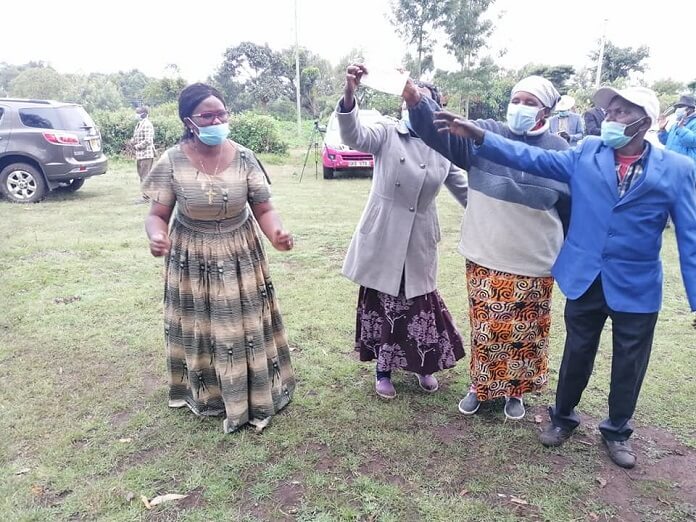Bishop Hon Kawira Mwangaza met with the Kirachene Clan Kiirua Nari and empowered them with Ksh 100,000 plus a 100 seater tent for their income generating project.
I told myself that if I had to work, I had to put everything else on hold and help the Meru child. People are perplexed as to where the money is coming from, despite the fact that I have the same cars, seats, money, and office.
People are curious about where I get the money that I distribute throughout the county at all hours of the day and night. My response is that it is due to a change in management.
A woman may be given KSh 1000 today and use the entire sum to purchase a liver. Later, she inquires as to what it will be eaten with. A wise woman will be given Ksh 1000 and will use it to purchase a kilo of maize, beans, cooking oil and soap.
That is the distinction in my leadership. The money and office were already there, and my predecessor was driving the same cars. As a woman, there is a concept known as management, which states that when you are given money, you must plan for it in order to manage your home.
With the little money my office receives, I am able to plan and manage it to the point where it exceeds what other offices receive. In comparison to all other offices, my office receives the least amount of money.
The MCA’s office receives Ksh 20 million per year in a ward. The MCA is expected to have completed development projects totaling Ksh 80 million in a ward after four years.
That means that after four years, I am expected to have completed development projects totaling Ksh 4 million in a ward, compared to an MCA who is expected to have completed development projects totaling Ksh 80 million and an MP who is expected to have completed development projects totaling Ksh 120 million in a ward.
The governor is expected to have completed development projects in a ward totaling Ksh 1 billion. The governor’s office is allocated Ksh 250 million per year in a ward, while the MP’s office is allocated Ksh 30 million per year in a ward.
In a ward, Mama County receives Ksh 4 million per year. The funds are the same for groups, clothing people with disabilities, schools, gas for cars, office expenses, and the construction of an upcoming center in Nkomo, which has never been built by another woman in Kenya other than Kawira.
I’m setting a good example for women by demonstrating how to carry out development projects. The center under construction receives half of the funds allocated to my office.
Meru County leads in cases of gender-based violence, with reports of women having their hand severed, being hit on the head, leg amputations, children being raped by a relative and in other cases being burned in houses.
I was always informed that a woman’s hand had been severed, another woman’s ear had been severed and many other cases when I received calls in the middle of the night.
I decided to establish the largest rescue center in Meru county for that child who has been raped by a relative and later released on bond and returns to that same child he had raped.
While I take legal action against the relative, the rescue center assists that child in healing.
The child is safe from post-traumatic stress disorder and she does not have to see the relative every day and night. As the rape case continues in court without the child being threatened, we educate her and look for a place where she can succeed in life.
The women are also being bitten and hacked with pangas, as in the case where one of a woman’s hands was severed. I had no idea what to do when the women were brought to me and they couldn’t all fit in my place.
The center will house that woman for a month or two and keep an eye on her as her wounds heal. The center is being built, and the president will be there to inaugurate it. The center is the only one of its kind in Kenya.
My office’s small budget is divided into the construction of the center, school uniforms, donations to groups and schools, enrolling youth in driving courses, and awarding bursaries.
I thank God for allowing me to think big and love my people. Others cited corona as the reason for their absence in mashinani. I have never failed to show up at the mashinani since the corona cases began until now when they have decreased.
I reminded myself that, despite the presence of the covid-19, we still needed to eat and clothe ourselves. I told myself that we would push forward while helping others, and that I would be by your side.
I vowed to protect my people, even if it meant suffering alongside them.
I made the decision that no money will be returned to the government because it hasn’t been planned for.
It is the reason that there has been zero development in Meru, according to reports. The money allocated for development projects such as boreholes, water, and other large projects is returned because a process must be followed and transparency is required.
More emphasis is being placed on money that can be easily stolen and is intended for small projects. However, no one wants to devote their time to development projects. My question is, where does the Ksh 10 billion allocated to Meru county each year end up?
For the last four years, we should have been promoting development projects worth Ksh 40 billion, such as one that provides people with jobs, access to water, and new schools.
We were promised water when we voted, but now that the term is coming to an end, I’m wondering where the water is.
We were promised that the roads would be repaired, but nothing has changed. You chose me to be your voice, but when I inquire about the status of development projects, roads, payments to those attacked by elephants, and the lack of medicines in hospitals in Meru County, I am told that the crocodile is still in the water.
As a Bishop, I replied that the crocodile that was still in the water had died in Jesus’ name. I vowed to guard the Meru child.



